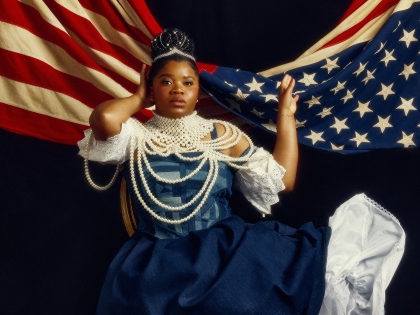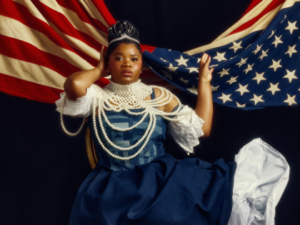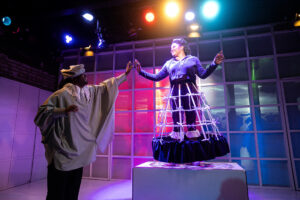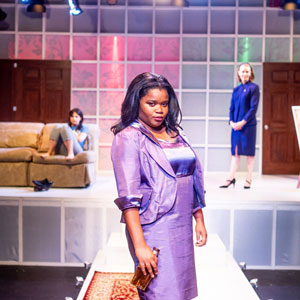
 ** Imaginative yet overly ambitious, “Coronation” is a dystopian speculation about our collective future, specifically about the future of women and democracy. In large part, it’s about reforming America’s political institutions to make them more responsive to the needs and desires of the population at-large. It also provides us with a stern warning about the possible misuses of artificial intelligence (AI) and what could happen when there is too much reliance on it. The play’s main message, though, has to do with the male dominated power structure and men’s oppression of women. Whenever women seek empowerment, men will constantly fight against this, and they will continually want to turn women into sex objects. But to get to this understanding, the audience must first get past the story’s basic premise: that there is a need for the United States to become more like Great Britain and adopt a fourth branch of government, namely that of Queen. As compared to an America with mostly male Presidents (who have often gotten little or nothing accomplished), the Queen would be a check on the Presidency. In addition to her ceremonial functions, she would be an advocate for meaningful social reform, such as ending hunger, putting an end to global warming, and fixing the broken electoral college.
** Imaginative yet overly ambitious, “Coronation” is a dystopian speculation about our collective future, specifically about the future of women and democracy. In large part, it’s about reforming America’s political institutions to make them more responsive to the needs and desires of the population at-large. It also provides us with a stern warning about the possible misuses of artificial intelligence (AI) and what could happen when there is too much reliance on it. The play’s main message, though, has to do with the male dominated power structure and men’s oppression of women. Whenever women seek empowerment, men will constantly fight against this, and they will continually want to turn women into sex objects. But to get to this understanding, the audience must first get past the story’s basic premise: that there is a need for the United States to become more like Great Britain and adopt a fourth branch of government, namely that of Queen. As compared to an America with mostly male Presidents (who have often gotten little or nothing accomplished), the Queen would be a check on the Presidency. In addition to her ceremonial functions, she would be an advocate for meaningful social reform, such as ending hunger, putting an end to global warming, and fixing the broken electoral college.
Written by Laura Winters and directed by Tova Wolff, the play is in three acts: The first takes place during the Presidential election of 2044, the second in the 22nd century, and the third in the 23rd century. In 2044, Maggie (Jodi Gage) is the first lady of a two-term President. She has backed a highly qualified and forceful woman candidate (Amber Washington) to replace her husband in office, but her close friend loses the election to a do-nothing male politician. As a consequence of this defeat, Maggie, her friend, and her daughter (Mary Tilden) develop a brilliant idea: Since people seem to defer to British royalty even in the United States, then why not establish a fourth branch of government to fix our broken democracy? Using Queen Kate Middleton as the example, the three of them suggest incorporating the position of Queen into the U.S. Constitution. It is the robotic AI system named Kiki that listens to this idea and incorporates it into its programming.
In the next act, we see how the role of Queen has become engrained into 22nd century American politics and government. The Queen is named Cornelia (Washington) and her ancestors (all ciswomen) have been very well-educated and can boast of all sorts of undergraduate and graduate degrees. But the male President Walker (Dylan J. Fleming) wants the Congress and the courts to reinterpret the Constitution so that she is no longer well-educated in terms of academics but rather in terms of performing the role of a monarch (e.g., wearing lovely clothes and acting enchantingly). We subsequently see how the position of Queen takes on a wholly ceremonial role in the 23rd century as compared to a politically active one. It is a feminized Kiki (played by Gage) who apparently lives from one century to the next and becomes the human beings’ historical and institutional memory. While we can question whether this is a good or bad thing, what we witness is that the robot acquires more human-like qualities over time.
The set is made up of glass blocks that are initially turquoise with gold flowers, which become a backdrop for projecting lots of different videos. Kudos to scenic and technical director Becca Venable who accomplished this. Highest marks must go to projection designer Abboye Lawrence. One of the best elements of the show is seeing the combination of psychedelic images, colors, and patterns together with a progression of the years going forward in time. The lighting design by Garrett Bell is generally good, but the strobe lights can be too much and are often unnecessary. Ethan Korvne’s sound design is frequently too loud when it comes to the special effects during the show, so I had to wear a pair of earplugs throughout. Costume design, the province of Gregory Graham, is, for the most part, nicely done. I particularly liked several of the costumes worn by the Queen. Also to be congratulated is the work of Hannah Andruss, the makeup, hair, and wig designer. But perhaps the most credit needs to be given to Kira Nutter, the fight and intimacy coordinator, whose work is really great, considering the close contact among several of the actors.
This world premiere production is both timely and relevant, especially regarding the caution about the potential dangers of artificial intelligence: that we’re all in trouble when AI makes the rules about how to deal with AI. Who is to say if robots will continue to follow the commands of human beings? This, of course, is the stuff of good science fiction. But other than that, the play generally falls flat on its face. Not only is the whole situation in each century highly improbable, but the script is much too preachy. It largely consists of a series of left-liberal talking points, plus an anti-male bias. It wasn’t entirely clear how lesbianism and transsexuality fit into the story (or were even necessary) relative to the promotion of ciswomen as Queens. What happens is that far too many aspects of the story become ridiculous, if not unseemly, as time goes on. Alternatively, one could look at the tale through the other end of the binoculars and argue that it only gets better whenever evil keeps rearing its ugly head. Of course, we know from the very beginning that the story is going to be fantastical—but when things become totally unrealistic and needlessly violent, they become untenable. I found myself tuning out even the most climactic parts of the story, and I wasn’t the only one looking at my watch.
“Coronation” is playing through November 16, 2024, at the Bookspan Theatre on the first floor of The Den Theatre, 1331 N. Milwaukee Avenue, in Chicago.
General admission tickets: $31 (includes a $1 facility fee) + $5.75 convenience fee
Premium tickets: $41 (includes a $1 facility fee) + $6.50 convenience fee
 Performance schedule:
Performance schedule:
Thursdays, Fridays, and Saturdays at 7:30 p.m.
Sundays at 3:00 p.m.
For more information about this show, go to: https://www.refractedco.com/coronation.
To purchase tickets, see: https://ci.ovationtix.com/35386/production/1210038.
For general information and to learn about Refracted Theatre Company’s other offerings, see: https://www.refractedco.com/.
Please note that the Bookspan Theatre was very chilly on opening night when we first walked in: I wasn’t the only one who put on my coat and hat—on one of the first truly fall-like October days in Chicago. In fact, the temperature seemed to be the same inside and outside of the theatre. It did warm up as the performance continued, and I watched others shed their coats.
To see what others are saying, visit www.theatreinchicago.com, go to Review Round-Up and click at “Coronation”.






More Stories
“The Magic School Bus: Lost in the Solar System”
“February House” reviewed by Julia W. Rath
” A Lie of The Mind”